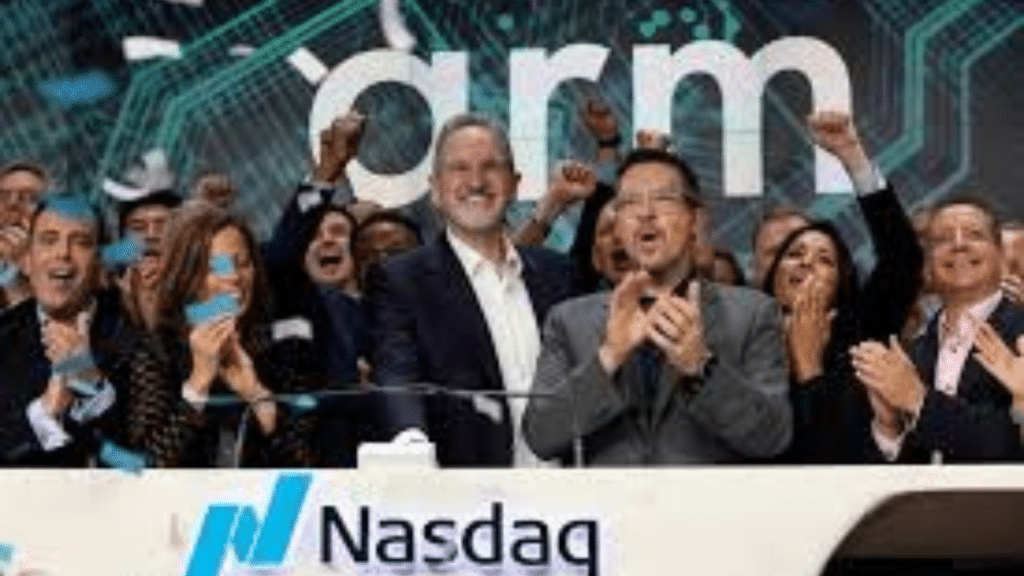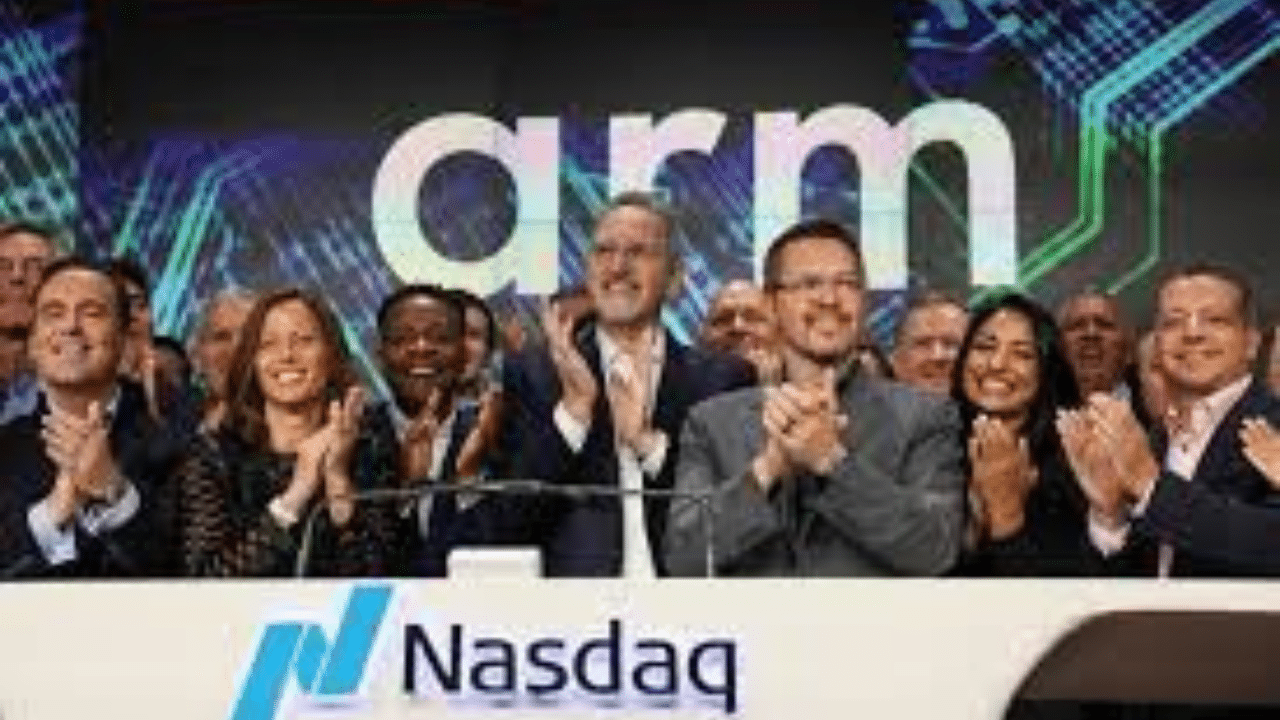“Arm’s IPO Frenzy: Riding the 25% Wave of Market Excitement!”

Arm Soars 25% in the Year’s Biggest Initial Public Offering
A warm welcome for the shares would probably mean many more companies going public in the coming months, ending the cold streak.
They rapidly learned the truth: It was the beginning of spring. At the start of trading, Arm’s iPO “Arm’s Epic 25% Surge: Unveiling the IPO Ride of 2023” shares were trading at $56.10, up 10% from their initial offering price of $51. As soon as trading ended, shares continued to fly, jumping another 25% to settle at $63.59, giving the business a fully diluted valuation of $67.9 billion.
This is good news for the listings of the advertising software business Klaviyo and the food delivery startup Instacart, which are anticipated to list next week. It also gives the entire tech sector a lift, which has been waiting over two years for the market to turn around.
According to David Hsu, a professor of management at the University of Penhttps://www.pa.gov/nsylvania’s Wharton School, “offerings like this are frequently beacons to try to decipher what is the sentiment, overall, of this marketplace.”
In 2023, the year that has been almost unbearably quiet for initial public offerings, Arm will be the largest business to face the public markets. The SoftBank-owned chip designer priced its IPO on Wednesday at $51 per share, bringing in $4.87 billion.
According to Renaissance Capital, which analyzes public offerings, 73 I.P.O.s in the US have raised $14.8 billion so far this year, including Arm upcoming ipo share. That represents a small portion of the IPOs in 2021, which saw 397 businesses raise $142 billion.
According to a PitchBook report, which analyzes start-ups, there are about 200 companies that should have gone public by this point. This Thursday, the private equity firm L Catterton filed paperwork to list the shoe manufacturer Birkenstock on the New York Stock Exchange.
According to Renaissance Capital, which analyzes public offerings, 73 I.P.O.s in the US have raised $14.8 billion so far this year, including Arm IPOs. That represents a small portion of the IPOs in 2021, which saw 397 businesses raise $142 billion.
According to a PitchBook report, which analyzes start-ups, there are about 200 companies that should have gone public by this point. This Thursday, the private equity firm L Catterton filed paperwork to list the shoe manufacturer Birkenstock on the New York Stock Exchange.
Many businesses are currently researching the market, according to Kyle Stanford, an analyst at PitchBook. “There is a demand.”
Arm iPOs is a test of the public market that is particularly fascinating since it offers a crucial technology that is strategically and geopolitically desired, but also presents obstacles.
The business, which was established in Cambridge, England, in 1990, sells blueprints for a processor core, a component of a microprocessor. Many of the biggest tech businesses in the world, such as Apple, Google, Samsung, and Nvidia, are among its clients.
Although Arm has positioned itself as being able to ride the wave of artificial intelligence sweeping Silicon Valley, its chip designs are mostly employed in smartphones.
On Thursday, Yoshimitsu Goto, the top financial officer of SoftBank, Rene Haas, Arm’s CEO, and other officials rang the Nasdaq opening bell at the exchange’s studio in Times Square in New York City.
Through a video link, about 2,000 Arm workers in Cambridge, England, took part in the celebration.
Mr. Haas stated in an interview that he was delighted that Arm’s product was priced towards the top of the suggested range but that it was more future-oriented.
Although today is a fantastic day, he declared, “I’m far, far more excited about the next five to ten years.” Arm has been expanding its product line to include its technology in a wide range of other items that have some level of processing capacity, such as autos, consumer goods, and data centers.
The company is not receiving any proceeds from the offering, since all shares were sold by SoftBank. Arm had more than $2 billion in cash and short-term investments to fund its activities as of the end of June.

In an interview with CNBC, Masayoshi Son, SoftBank’s chief executive, said he paid that price tag because of his confidence in Arm’s future and that he expected the stock to have “good upside” over the long term.
He continued by saying that SoftBank was unlikely to sell more of its around 90% ownership in the business. Our goal is to hold as much as we can for as long as we can, he said.
With low expectations, investors are still wary or skeptical of other Internet businesses that are getting ready to go public, such as Instacart and Klaviyo.
Instacart is expected to be valued far lower than its previous private market estimate of $39 billion for its IPOs, which it announced as the opening price range for its initial public offering (I.P.O.) pitch meetings this week. A little lower than its most recent private valuation of $9.5 billion for IPOs, Klaviyo began its pitch meetings with a valuation range of $7.7 billion to $8.3 billion.
Many of the companies have tried to convince Wall Street that their public offerings are acceptable investments in an effort to boost investor confidence. Before making its offering, Arm claimed to have secured $735 million in “stated interest” from businesses it collaborates with, including Nvidia, Google, Samsung, Apple, and Intel, to purchase its shares.
Although Taiwan Semiconductor Manufacturing Company stated last week that its directors had approved an investment of up to $100 million in the offering, Arm on Thursday did not provide any additional information regarding such investments.
Similar action was taken by , which instacart ipo old $175 million of its I.P.O. shares to PepsiCo. Additionally, Klaviyo disclosed that, in advance of its sale, the company had acquired “cornerstone” investments from the financial institutions BlackRock and AllianceBernstein. Trumpeting such commitments before to an IPO is less frequent during prosperous market conditions, according to Mr. Hsu of Wharton.
The profits of Arm, Klaviyo, and Instacart have also received notice. Investors are becoming more risk-averse as a result of rising interest rates and inflation, and many are prioritizing profitable businesses above those with rapid growth.

Contrast the earnings with the many cash-burning businesses that went public in the boom years of 2021, whose stock prices have subsequently fallen. Bird, a scooter firm that was once valued at $2.5 billion, is now only worth $11 million. The office-sharing business WeWork, which had a private market valuation of $40 billion, now has a market capitalisation of just $270 million.

